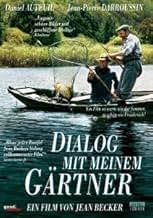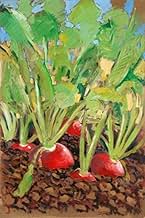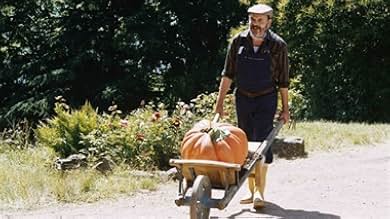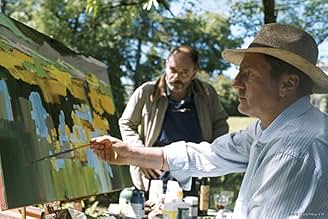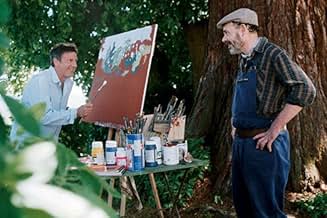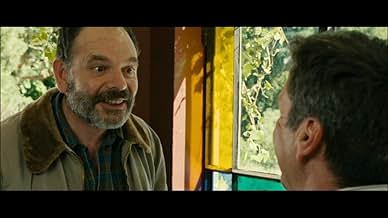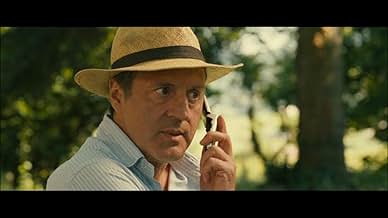VALUTAZIONE IMDb
7,1/10
3929
LA TUA VALUTAZIONE
Un artista di successo, stanco della vita parigina e sull'orlo del divorzio, torna in campagna per vivere nella casa della sua infanzia.Un artista di successo, stanco della vita parigina e sull'orlo del divorzio, torna in campagna per vivere nella casa della sua infanzia.Un artista di successo, stanco della vita parigina e sull'orlo del divorzio, torna in campagna per vivere nella casa della sua infanzia.
- Regia
- Sceneggiatura
- Star
- Premi
- 1 vittoria e 2 candidature totali
Elric Thomas
- Le dentiste
- (as Eric Thomas)
Mickey Dedaj
- Ambulancier 1
- (as Micky Dedaj)
Stephane Kordylas
- Ambulancier 2
- (as Stéphane Kordylas)
Recensioni in evidenza
Internationally known as "Conversations with My Gardener" this film deals with an artist that moves back to his small country side village of birth after living in the hectic and fast paced Paris for a good number of years. He is still married but divorce is on the way and is in desperate need of a change.
Once back on the country side he hires a gardener to work his garden while he works his art and as it turns out the gardener is a childhood friend of his that has been living in the village his whole life. When the two meet again they start reliving old memories and conversing about just about everything and inspiring each other in many ways, both learning something they had long since forgotten.
Beautiful imagery, nice mellow music, realism. But above all, a sparkling unity between the two main characters. With that the film has all the ingredients to be a great film. It falters on only a few spots and IMO the one place where it really fails is by taking a very often used cliché to add some events to the ending that work toward a quicker ending but toward nothing else.
8 out of 10 long talks on a midsummer night
Once back on the country side he hires a gardener to work his garden while he works his art and as it turns out the gardener is a childhood friend of his that has been living in the village his whole life. When the two meet again they start reliving old memories and conversing about just about everything and inspiring each other in many ways, both learning something they had long since forgotten.
Beautiful imagery, nice mellow music, realism. But above all, a sparkling unity between the two main characters. With that the film has all the ingredients to be a great film. It falters on only a few spots and IMO the one place where it really fails is by taking a very often used cliché to add some events to the ending that work toward a quicker ending but toward nothing else.
8 out of 10 long talks on a midsummer night
Jean Becker makes extremely typical french films, with lots of dialog, and masterful mise en scene. This film plays again with one of his favorite subjects, the wisdom of the uncultivated, working class simpletons, as opposed to the stiff way of life of the cultivated bourgeoisie. More or less. The story, a painter who goes back to the village of his childhood and befriends a retired railroad worker he hires as gardener ad happens to be an old childhood friend, serves well as an excuse for a series of enlightening dialogs and thoughts over class, life, struggle, love, etc. When it ends you have been entertained brilliantly for 90 minutes, and you are also left with something to think about.
Our usual group of 4 Dutch, Filipino, Chinese Malaysian, and French did enjoy so much this movie screened in Sydney these past few weeks. As said before simple but without simplicity. This was also my sentiment, I imagine my french background took my enjoyment even a little further. I can't say I never had much passion for gardening although I do appreciate nature in general. But I like animals and people behaviour; it is so often fascinating. This is what this story did for me, it brought fascinating union and mutual respect between two very different people, this in a rather natural way. I let myself go with the gentle flow of the tale and rode the few bumps here and there as life scatters them. I won't talk about the story line since I'm sure it's been read many time before these lines. There weren't a crowd either in the cinema, only one more couple and one lone other person. Yet the story took you from the start and you did not need a crowd around to help you along. It was almost like a personal experience that somehow made you feel as if you were part of this dialogue. I do much appreciate Daniel Auteuil whom I discovered for the first time with G de Pardieu in "Jean des Florettes" and "Manon des Sources" Much as happened since and for both of them but one seems to have been imunised from Hollywood and is better for it in my opinion.
His great performance is the axis of this moving short film about two friends encounter after decades , their jobs, family, memories, routine, different perspectives and different options but, both complementary.
A film who easy can be defined as good adaptation or bitter - sweer comedy , or demonstration of brilliant acting.
In fact, a beautiful invitation to viewer to discover himself, the near others, the beloved ones, the value of interests and virtues.
And a touching return to clear, precise, gentle, useful, honest simplicity, hiding painful details, offering naif, at first sight, perspective about life, defining, in proper terms, generosity and kindness.
In short, a film who must you see.
A film who easy can be defined as good adaptation or bitter - sweer comedy , or demonstration of brilliant acting.
In fact, a beautiful invitation to viewer to discover himself, the near others, the beloved ones, the value of interests and virtues.
And a touching return to clear, precise, gentle, useful, honest simplicity, hiding painful details, offering naif, at first sight, perspective about life, defining, in proper terms, generosity and kindness.
In short, a film who must you see.
Suppose another civil war broke out in France some day, well, Jean Becker might start it! Indeed because of him the country is now divided into two fratricidal sides: the spectators and the critics! As for the spectators, they flock to Jacques Becker's son's films and invariably love all he has done from "les Enfants du Marais" (1998). I personally -just like everybody else except the critics - have been amused and touched by the aforementioned movie as well as "Un crime au Paradis", "Effroyables Jardins" and his latest opus "Dialogue avec mon Jardinier". Simple but not simplistic, moving without being overly sentimental, humane but not populist, Jean Becker's last picture talks directly to the heart .On the other side you have the critics. This happy few are beside themselves with a man who dares show ordinary unaffected characters rather than Paris intellectuals between themselves, who tries to make our daily lives better rather than denigrate all the values not deemed valid by their highbrow circle. But let the civil war start: we spectators outnumber the critics by far. They are bound to be defeated!
As is always the case with Becker's recent movies, the story is very simple, not depending on plot twists or dramatic ups and downs to exist. However if you read the eponymous book (by Henri Cueco) which inspired the film, you will realize that the adaptation work (by talented Jean Cosmos) was no pleasure cruise. The title of Cueco's book ("Dialogue avec mon Jardinier") is telling in this respect: It has no storyline to speak of. It all amounts to a conversation between a Paris artist and his local gardener at the former's family house. Even more difficult, in the text, consisting mainly in the gardener's replies, there is no such thing as a real dialogue. You actually get to know the artist through the gardener's answers. How anti cinematographic! A carbon copy was impossible and Cosmos set about bringing on a few changes. Of course, he fleshed out the painter's character, modified a few facts (the artist is on the verge of divorce, he has a daughter about to marry, the circle of artists he used to mix with is described and satirize - hence the critics' reaction! - ; the gardener has become the artist's childhood friend, he does not a have a young daughter ) and created a subplot (concerning mostly the relationships between the artist, his separated wife and his young adult daughter). This way, although there is not much action other than an evolution in the characters' minds and feelings, "Dialogue avec mon Jardinier" functions as a true film, with a beginning, a middle and an end. But what is the most remarkable is that the dialogue of the book is transposed in full, with only a few minor additions or deletions. Such wonderful work allows Becker's last movie to attract the viewer while remaining faithful to the spirit of Cueco's original work: a sophisticated artist learns the basics of life while a John Doe is introduced to a world that totally escaped him before and enrich their minds mutually as a result.
The text is served by two outstanding actors, Daniel Auteuil (as subtle and humane as he can be) and Jean-Pierre Darroussin (absolutely amazing as the down-to-earth but not common gardener).
When you leave the theater you feel peaceful and happy despite the heart-breaking ending. It is the (French) critics' loss if they make all the efforts in the world to dislike such a beautiful film.
As is always the case with Becker's recent movies, the story is very simple, not depending on plot twists or dramatic ups and downs to exist. However if you read the eponymous book (by Henri Cueco) which inspired the film, you will realize that the adaptation work (by talented Jean Cosmos) was no pleasure cruise. The title of Cueco's book ("Dialogue avec mon Jardinier") is telling in this respect: It has no storyline to speak of. It all amounts to a conversation between a Paris artist and his local gardener at the former's family house. Even more difficult, in the text, consisting mainly in the gardener's replies, there is no such thing as a real dialogue. You actually get to know the artist through the gardener's answers. How anti cinematographic! A carbon copy was impossible and Cosmos set about bringing on a few changes. Of course, he fleshed out the painter's character, modified a few facts (the artist is on the verge of divorce, he has a daughter about to marry, the circle of artists he used to mix with is described and satirize - hence the critics' reaction! - ; the gardener has become the artist's childhood friend, he does not a have a young daughter ) and created a subplot (concerning mostly the relationships between the artist, his separated wife and his young adult daughter). This way, although there is not much action other than an evolution in the characters' minds and feelings, "Dialogue avec mon Jardinier" functions as a true film, with a beginning, a middle and an end. But what is the most remarkable is that the dialogue of the book is transposed in full, with only a few minor additions or deletions. Such wonderful work allows Becker's last movie to attract the viewer while remaining faithful to the spirit of Cueco's original work: a sophisticated artist learns the basics of life while a John Doe is introduced to a world that totally escaped him before and enrich their minds mutually as a result.
The text is served by two outstanding actors, Daniel Auteuil (as subtle and humane as he can be) and Jean-Pierre Darroussin (absolutely amazing as the down-to-earth but not common gardener).
When you leave the theater you feel peaceful and happy despite the heart-breaking ending. It is the (French) critics' loss if they make all the efforts in the world to dislike such a beautiful film.
Lo sapevi?
- Citazioni
Le jardinier Léo dit Dujardin: Always carry a knife and a piece of string. They can be a life saver.
- ConnessioniFeatured in Les Coulisses du Jardin (2007)
- Colonne sonoreConcerto pour clarinette
Composed by Wolfgang Amadeus Mozart
I più visti
Accedi per valutare e creare un elenco di titoli salvati per ottenere consigli personalizzati
Dettagli
- Data di uscita
- Paese di origine
- Siti ufficiali
- Lingua
- Celebre anche come
- Conversations with My Gardener
- Luoghi delle riprese
- Musée de l'Education du Val-d'Oise, 2 place des Ecoles, Val-d'Oise, Francia(two kids explode a firecracker in a flashback scene)
- Aziende produttrici
- Vedi altri crediti dell’azienda su IMDbPro
Botteghino
- Lordo in tutto il mondo
- 15.217.960 USD
Contribuisci a questa pagina
Suggerisci una modifica o aggiungi i contenuti mancanti

